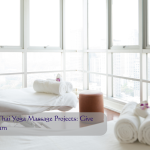Migraines are a debilitating condition that affect millions of people worldwide. These severe headaches are often accompanied by nausea, vomiting, and sensitivity to light and sound. While there are various medications available, some people seek natural and complementary therapies for migraine relief. One such therapy gaining traction is Thai yoga massage.
What is Thai Yoga Massage?
Thai yoga massage is an ancient healing practice originating in Thailand. It combines acupressure, yoga postures, and Indian Ayurvedic principles to promote relaxation, improve flexibility, and enhance overall well-being. Unlike Swedish massage where you lie passively on a table, Thai yoga massage involves active participation from the recipient. The therapist uses their hands, thumbs, elbows, and even feet to apply pressure, stretch your muscles, and improve your range of motion.
Can Thai Yoga Massage Help with Migraines?
While more research is needed, some studies suggest that Thai yoga massage may offer relief for migraines. Here’s how it might be beneficial:
- Reduces Muscle Tension: Migraine headaches are often linked to tension in the neck, shoulders, and scalp. Thai massage focuses on these areas, releasing tightness and promoting relaxation, which can reduce pain intensity.
- Improves Blood Flow: Poor blood circulation can contribute to migraines. Thai massage techniques like acupressure and stretching can enhance blood flow throughout the body, potentially alleviating migraine symptoms.
- Lowers Stress: Stress is a well-known migraine trigger. Thai massage has been shown to reduce stress hormones like cortisol, promoting relaxation and potentially reducing the frequency and severity of migraines.
- Boosts Endorphins: Massage therapy is known to stimulate the release of endorphins, the body’s natural painkillers. This can help manage migraine pain and discomfort.
What the Research Says:
Several small studies have explored the potential benefits of Thai yoga massage for headaches. A study published in the Journal of Alternative and Complementary Medicine found that regular Thai massage sessions significantly reduced migraine frequency and intensity compared to a control group.
Another study, published in the International Journal of Therapeutic Massage and Bodywork, showed that Thai massage combined with self-care techniques was more effective in reducing migraine frequency than self-care alone.
It’s important to note that these studies are preliminary, and larger scale research is needed to definitively establish the effectiveness of Thai yoga massage for migraines.
What to Expect During a Thai Yoga Massage Session
A typical Thai yoga massage session lasts for 60 to 90 minutes. You’ll wear loose-fitting clothing that allows for easy movement. The massage takes place on a mat on the floor. The therapist will guide you through a series of yoga-like postures while applying pressure and stretches to various muscle groups. Communication is key – let your therapist know if anything feels uncomfortable or painful.
Here are some additional things to keep in mind:
- Be upfront about your migraines: Inform your therapist about your migraine history, triggers, and any medications you’re taking.
- Hydrate: Drink plenty of water before and after your massage session.
- Listen to your body: If you experience any dizziness or discomfort during the massage, speak up immediately.
- Give it time: While some people experience immediate relief, Thai massage may take a few sessions to show its full benefits.
Is Thai Yoga Massage Right for You?
Thai yoga massage is generally safe for healthy adults. However, it’s not recommended for people with certain medical conditions like osteoporosis, blood clots, or recent injuries. It’s always best to consult with your doctor before trying any new therapy, especially if you have any underlying health concerns.
Here are some additional considerations:
- Pregnancy: Thai massage may not be suitable during pregnancy. Discuss any massage therapy with your doctor if you’re pregnant.
- Certain medications: Some medications can interact with massage therapy. Talk to your doctor if you’re unsure.
Conclusion
Thai yoga massage offers a natural approach to managing migraines. While research is ongoing, some studies suggest it may be effective in reducing pain intensity and frequency. If you’re looking for a complementary therapy to manage your migraines, Thai yoga massage could be a worthwhile option. However, it’s crucial to consult with your doctor before starting any new therapy, especially if you have any underlying health conditions.



